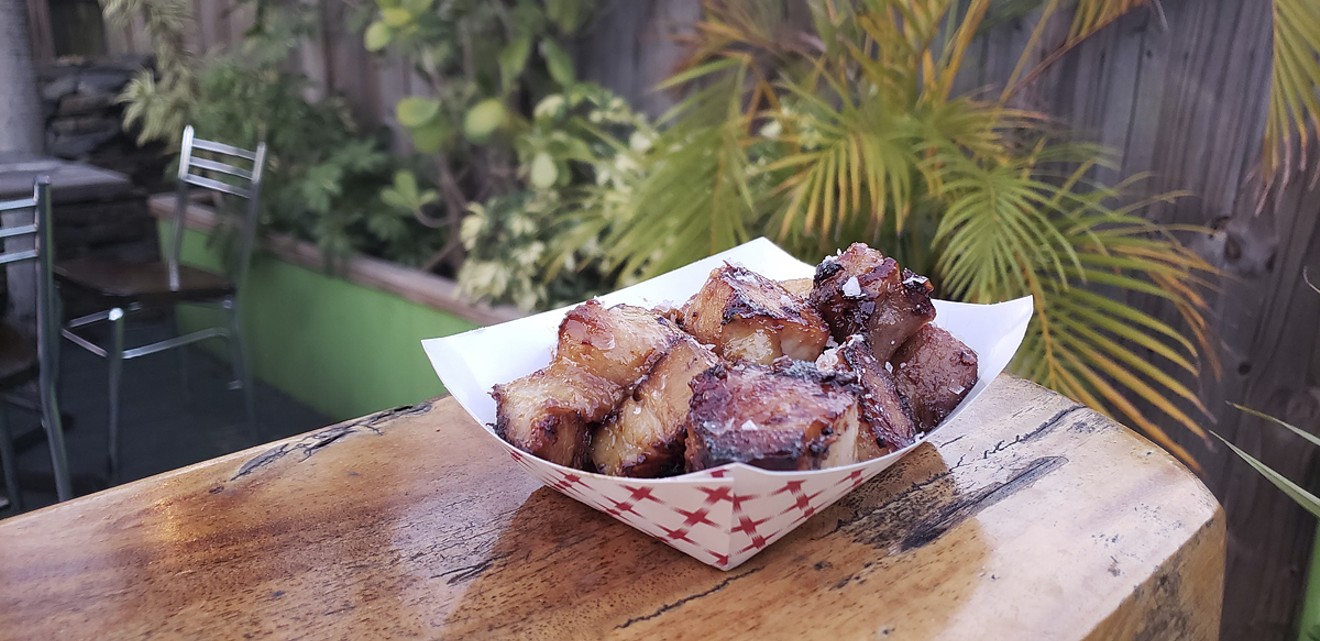Erick Briceño and Michael Honore are obsessed with Jupiña. So much so that a few months ago, when the two 35-year-olds were testing basting sauces for their forthcoming barbecue spot, they took about eight liters of the sugary, pineapple-flavored beverage and reduced it to a thick syrup that could barely fill half a soda can.
The syrup, combined with apple cider vinegar and molasses, becomes the mop sauce, a thin kind of marinade that is the cornerstone of all the slow-smoked pork served at Pittboyz BBQ, which recently opened behind Calle Ocho's Bar Nancy.
Barbecue in Miami can be hard to grasp or define. Other than a few places, most of what one might call barbecue here is more a Georgia-style hybrid of grilling and smoking either baby-back ribs or whole chickens. The rare spots that give brisket or pork the dozen-plus hours of pure smoke that's synonymous with Texas or Carolina barbecue are faithfully trying to replicate an established style. With their Jupiña mop sauce, black-as-night Malta barbecue sauce, and pork belly burnt ends ($10), Briceño and Honore have finally invented a style of barbecue synonymous with Miami.
The pair met at Miami Beach High School and, despite taking different paths, always kept in close contact. Briceño got into electrical sales, while Honore went straight into restaurants after school, first at Johnny Rockets before toiling his way up to work for Phil Bryant and later Michael Beltran at Ariete. After that, he left for Colorado for a couple of years before returning to South Florida to work at the short-lived South Miami oyster bar Shelley's.
"Barbecue had always been a hobby and a passion," Honore says. But it wasn't until a one-off event about a year ago that he began cooking it in earnest. Now he uses a trio of offset smokers and white oak from North Florida to smoke pork shoulders, ribs, corvina, and even pumpkin for vegetarians.
Still, it's the belly burnt ends that seem the most representative of the pair and of Miami. You'd be hard-pressed to find a recent food-travel show where the hosts don't stop at El Palacio de Los Jugos and roll their eyes in ecstasy while biting into that first piece of chicharrón. Nothing says Saturday in Miami more than long, fatty strips of pork belly sizzling in a well-worn pot at Ortelio Cárdenas's El Mago de las Fritas.
The Jupiña mop sauce reduces into a thick glaze, adding a layer of tacky crunch.
tweet this
Honore begins with a whole pork belly that's skinned and braised for three hours in a brew of condensed milk, Jupiña, orange peel, cardamom, and cinnamon. The belly is then extracted, cooled, and popped into a smoker for three hours to continue rendering the fat while filling the unctuous striped meat with a strong dose of smoke. Finally, it's portioned into bite-size pieces. When an order comes in, one of the two throws a heap of the meat into a pan to let it crisp a bit, along with a ladle of that Jupiña mop sauce, which reduces into a thick glaze, adding an additional layer of tacky crunch. With a curl of magenta pickled onion or a coin of vinegar-infused carrot from their recently launched pickle program, each bite is nearly perfect.
Barbecue purists might scoff at such a dish, declaring it heresy in comparison to traditional burnt ends, which are the crisp bits cut off the ends of smoked brisket and sold separately. Though barbecue and its many styles garner religious, borderline-dogmatic obsession, it's important to remember that slowly cooking meat over heat is simultaneously an ancient and modern obsession.
Barbecue might be one of the very few real "American" traditions. When the conquistadors landed on the now-Caribbean islands, they were confronted by indigenous people cooking meat over open flames using a lattice of sticks, according to English explorer William Dampier's 1697 tome, A New Voyage Around the World. The word "barbecue" itself derives from the Spanish term "barbacoa." As white Europeans overtook the Western Hemisphere and fanned out across what is now the United States, barbecue, in Texas at least, was born only a century or so ago from the wombs of butcher shops looking to profit off aging cuts of meat that would have otherwise been destined for the garbage.
Honore and Briceño's burnt ends are the last step of a journey that began eons ago, when man first set animal flesh over a flame. Barbecue is defined by the people who make it and the places where it's made. Hence, Texas, thanks to its cattle industry, is loyal to beef, and North Carolina's pork industry made that state the land of the whole hog. What Pittboyz is doing is crystallizing Miami's identity as a city that's attached to America and aware of its traditions but is also filled with the heritage of those who've come here and reinvented the place in ways few could imagine.
Pittboyz BBQ. 2007 SW Eighth St., Miami; instagram.com/pittboyz.bbq. Tuesday through Saturday 5:30 to 10 p.m.












